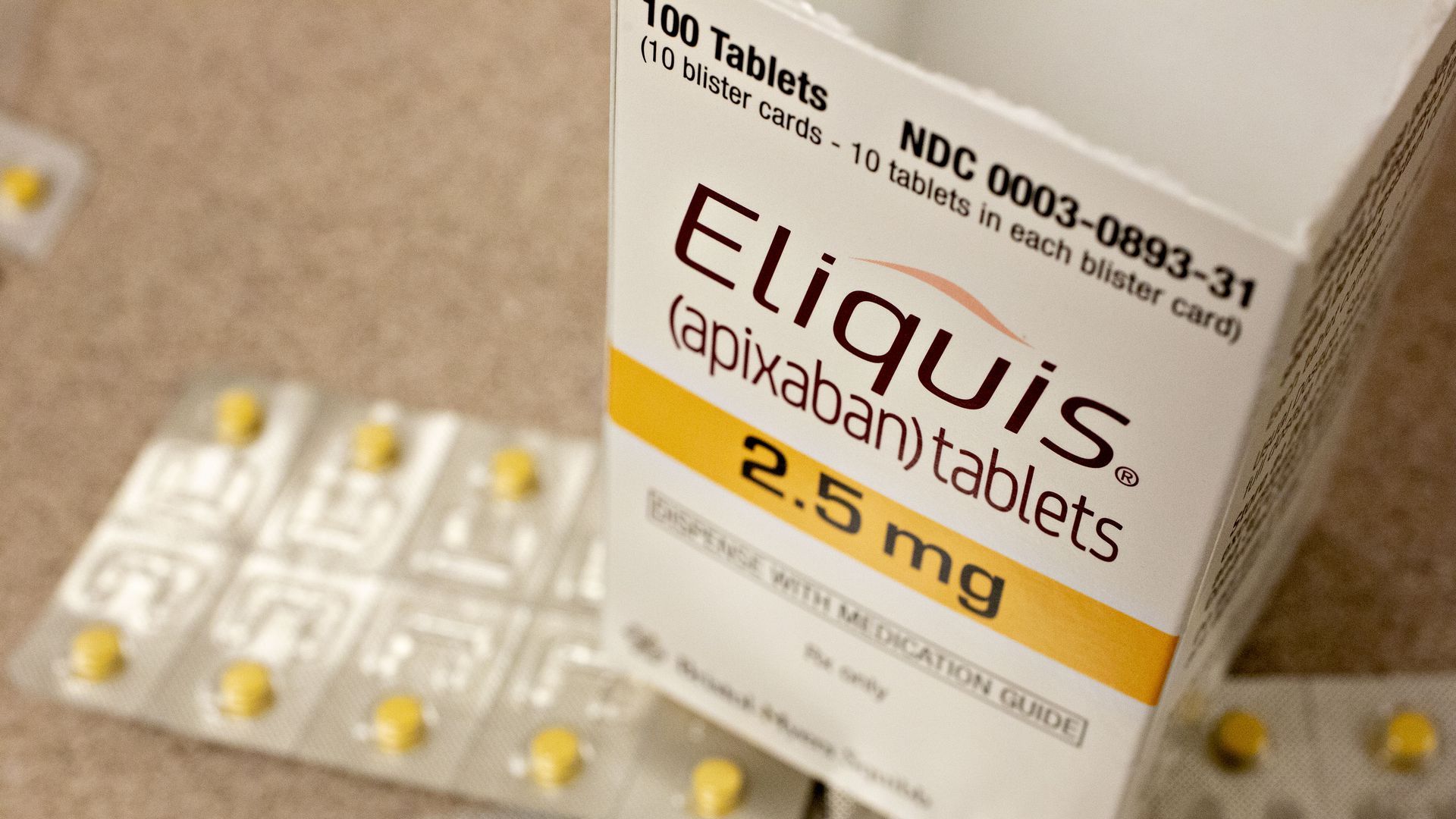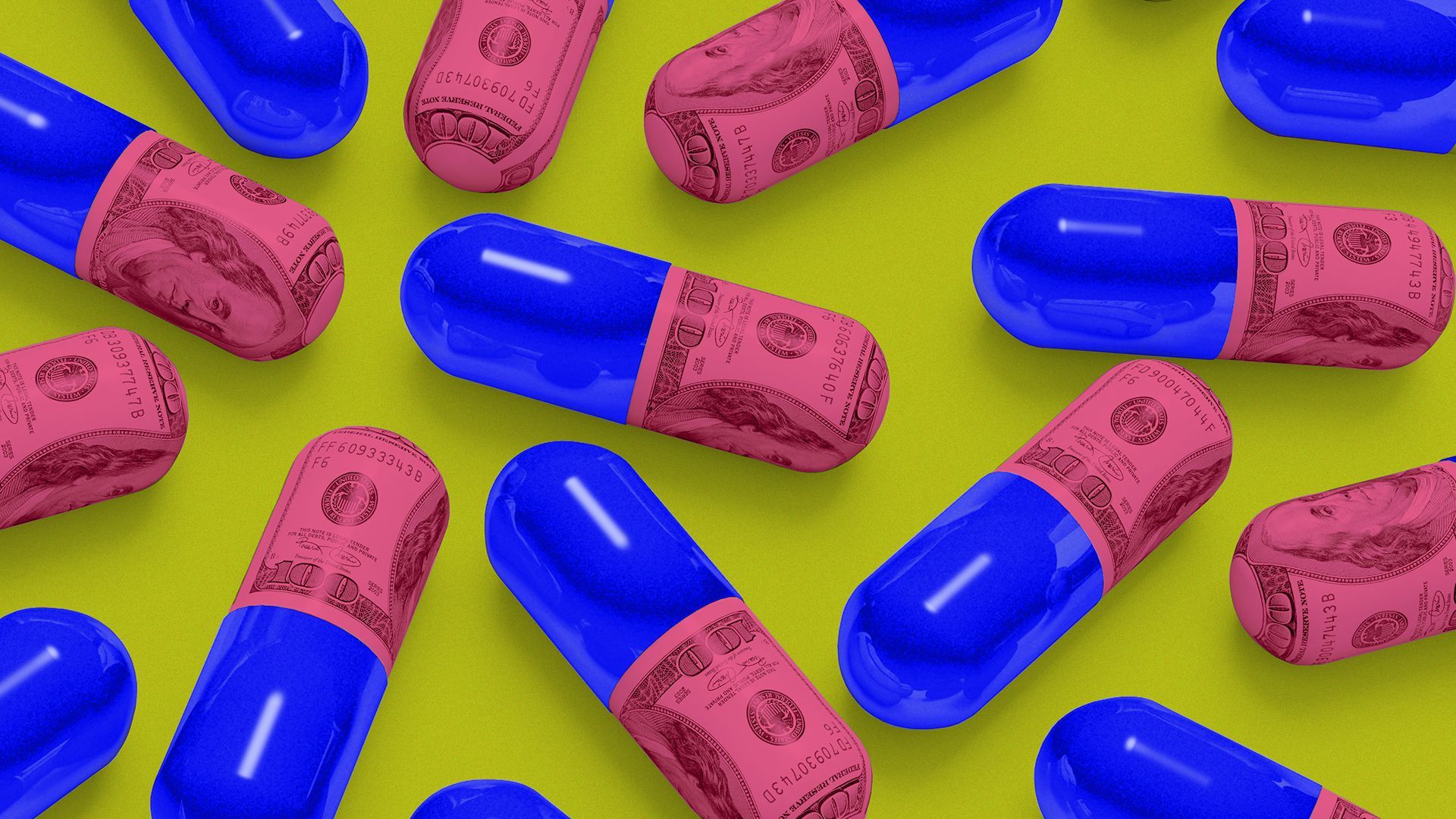| | | | | | | Presented By Blue Cross Blue Shield Association | | | | Axios Vitals | | By Tina Reed ·Jun 16, 2021 | | Good morning. Today's newsletter is 921 words, or a 3-minute read. But first, a quote of the day: "Did Biogen consider the list price impact on taxpayers, employers, individuals, and Medicare beneficiaries? If so, specifically how?" — Rep. Peter Welch, D-Vt., in a letter to the pharma company about its $56,000 list price for Alzheimer's drug Aduhelm | | | | | | 1 big thing: Medicare drug spending soars |  | | | Medicare spent $7.3 billion on blood thinner Eliquis in 2019, before rebates. Photo: Daniel Acker/Bloomberg via Getty Images | | | | The amount Medicare spent on drugs that are dispensed at pharmacies increased 26% from 2013 through 2018, members of the Medicare Advisory Payment Commission wrote in their new annual report. Why it matters: MedPAC members put the spotlight on pharmaceutical companies, attributing "nearly all of the growth ... to higher prices rather than an increase in the number of prescriptions filled by beneficiaries," Axios' Bob Herman writes. Between the lines: Medicare Part D plans, which are operated by health insurers and pharmacy benefit managers, say they save taxpayers money by negotiating rebates and discounts from drug manufacturers in exchange for putting drugs on their approved coverage lists. - And drug companies say the volume of prescriptions often leads to bigger spending totals.
Yes, but: Rebates and prescription fill rates did not offset the price growth, which MedPAC members said was due to "both higher prices of existing products and high launch prices of new drugs." - A new Health Affairs study also said a large share of Medicare drug spending is going toward "ultra-expensive" drugs.
Share this story. |     | | | | | | 2. Prior infections and herd immunity |  | | | Illustration: Annelise Capossela/Axios | | | | People who were previously infected with the coronavirus have some level of protection against reinfection, but that doesn't mean they shouldn't get vaccinated, Axios' Caitlin Owens writes. Why it matters: If you're trying to calculate herd immunity, previous infections count for something. - In a Wall Street Journal op-ed, Johns Hopkins School of Medicine professor Marty Makary recently argued more weight should be given to factoring in prior COVID-cases. "There's ample scientific evidence that natural immunity is effective and durable," he said.
Yes, but: We don't know how long immunity lasts, and getting at least one shot of a vaccine increases people with prior infections' level of protection against variants. - "Natural infections, those give you a degree of protection, but it's boosted — in a highly relevant way — by vaccination," said John Moore, a professor and virologist at Cornell.
- "With antibody-resistant variants on the spread, getting the vaccine is an important thing to do," he added.
Between the lines: Americans started getting infected with the coronavirus nearly a year before the vaccination campaign began, meaning that people who were infected a while ago may have a decreased level of protection than those who were infected or vaccinated recently. |     | | | | | | 3. Anthem joins insurer-backed generics effort |  | | | Illustration: Rae Cook/Axios | | | | A new initiative aiming to create cheaper generic drugs for retail pharmacies signed on Anthem Blue Cross Blue Shield — one the largest insurers in the U.S. — as well as drug manufacturer Catalent as partners, officials announced this morning. Driving the news: The newly-named CivicaScript, a subsidiary of the hospital-owned non-profit drug maker Civica Rx, is the latest effort by the health care industry to get control of generic drug prices. - Civica also announced they brought on industry veteran Gina Guinasso, formerly of OptumRx, as president of CivicaScript.
Civica officials say the plan is to develop and manufacture six to 10 common, high-priced generic medications without enough competition to drive down the price. - They declined to specify which drugs they will target. They also said they are planning to launch their first drug in 2022 but declined to be more specific.
With its 43 million members, Anthem was a significant addition to the initiative by bringing a larger piece of the market to the table, said Martin VanTrieste, Civica Rx's CEO. - "It also allows us to be more efficient in manufacturing. Efficiency in manufacturing allows us to reduce our cost which can be passed on to the consumer," he said.
|     | | | | | | A message from Blue Cross Blue Shield Association | | Expanding access to care | | |  | | | | 90% of Americans have health care coverage through their jobs, the individual market, Medicare or Medicaid. We can build on what we have to achieve universal coverage, lower costs and make health care more equitable. See how Congress can help. | | | | | | 4. State of the shots |  Data: CDC; Chart: Danielle Alberti/Axios In 15 states, at least 70% of adults have received at least one dose of a COVID-19 vaccine, the latest CDC data shows. On the flip side, fewer than 50% of adults have gotten at least one shot in four states including Wyoming, Louisiana, Mississippi and Alabama. - The majority of states (29) have reached 60% or more of adults with at least one dose of the vaccine.
|     | | | | | | 5. Tech's mental health moment |  | | | Illustration: Aïda Amer/Axios | | | | COVID-19 shed light on and exacerbated the structural problems in the U.S. mental health care system — which often requires patients to seek out care and pay out-of-pocket for it. Why it matters: Demand for mental health services has skyrocketed, and therapists have reported difficulty meeting demand, Axios' Naomi Shavin reported in the latest episode of Axios Re:Cap. - Shavin interviewed Chris Molaro, CEO of NeuroFlow, to discuss how mental health technology has evolved in the midst of the pandemic.
- "If there was ever a silver lining to an 18-month pandemic, it was the fact that as a society, as a collective, we're acknowledging and, and owning the fact that mental health is, is a serious issue .... We feel more comfortable saying, 'You know what? Yeah, I was pretty depressed over the last 12 months,'" Molaro said.
Listen here. |     | | | | | | 6. COVID's personal impact |  | | | Illustration: Aïda Amer/Axios | | | | "I would ask him if he had a fever and if his vitals are normal. I'd ask about his respiratory rate. Then I would say, "OK, good. Let's hang in there for a little longer. You're gonna come through this. We will try it again tomorrow." And the last thing I said to him was, "I love you." And he was intubated that night. — Need Vahil, a medical student sharing his experience of death of his father — a gastroenterologist in Colorado — due to COVID-19. Driving the news: Vahil's audio recording and about 700 others from The Nocturnists podcast were donated to the Library of Congress for its "stories of the Pandemic" archive, the American Folklife Center confirmed to Axios' Marisa Fernandez. - The episode aired the same day the U.S. passed the grim milestone of 600,000 dead from COVID-19.
|     | | | | | | A message from Blue Cross Blue Shield Association | | Continuing the fight for America's health | | |  | | | Nationwide, Blue Cross and Blue Shield companies are supporting communities and helping Americans get vaccinated by: - Building confidence in vaccines.
- Partnering to meet local needs.
- Connecting with the most at-risk.
For the health of America. | | |  | | The tool and templates you need for more engaging team updates. | | | | | | Axios thanks our partners for supporting our newsletters. If you're interested in advertising, learn more here.
Sponsorship has no influence on editorial content. Axios, 3100 Clarendon Blvd, Suite 1300, Arlington VA 22201 | | | You received this email because you signed up for newsletters from Axios.
Change your preferences or unsubscribe here. | | | Was this email forwarded to you?
Sign up now to get Axios in your inbox. | | | | Follow Axios on social media:    | | | | | |











No comments:
Post a Comment